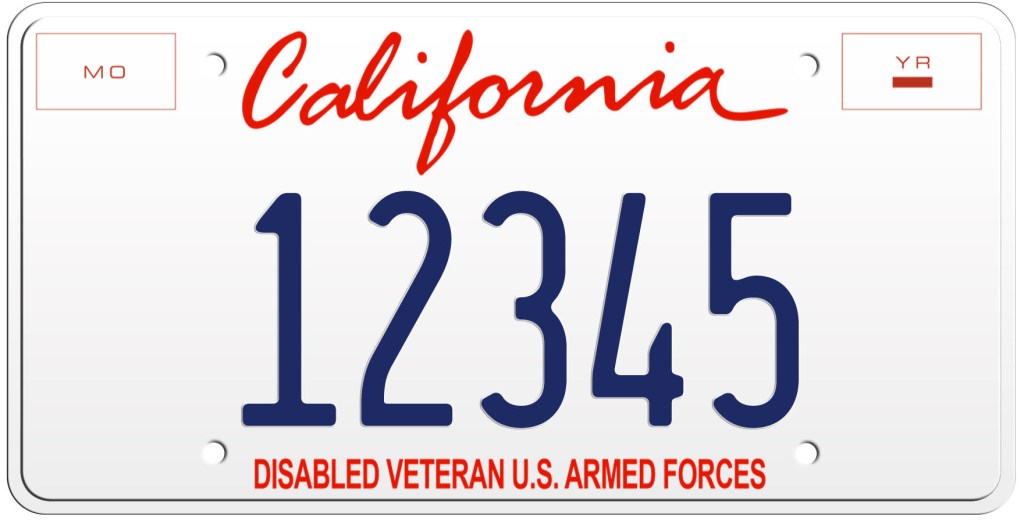Three Riverside patrol officers are being investigated by the Police Department for having disabled military veteran license plates on their personal vehicles while working as active-duty officers, their attorney said.
The officers, who attorney Matthew McNicholas declined to identify, have been suspended but have done nothing wrong, he said.
The plates, issued in California by the Department of Motor Vehicles, are provided when a doctor, optometrist, chiropractor or one of several other health care professionals certifies that the veteran has severe mobility issues, has lost the use of a limb, has suffered permanent blindness or has been certified as 100% disabled by the U.S. Department of Veterans Affairs.
The DMV “is required” to accept that VA certification, the DMV website says. The decision to issue a plate does not consider a person’s current employment.
Riverside Police Chief Larry Gonzalez said he would not “confirm or deny” that the suspensions are related to disabled veteran license plates. Gonzalez said the investigation will determine whether the officers can physically do their job and whether dishonesty was involved.
The license plates allow motorists to park in designated handicapped parking spots, along blue (for handicapped) and green (for loading) curbs with no time limit, in areas that require a resident permit and for free in metered parking areas, according to the DMV. The plates also exempt the users from vehicle registration and license fees and allow them to have their gas filled at stations by an attendant at self-serve prices.
Disabled placards provide the same parking privileges, but unlike the plates, may be moved from one vehicle to another.

McNicholas read what he said was a letter from the Police Department to the officers in a video posted to the Riverside Police Officers’ Association Facebook page.
“It has come to the department’s attention that you have disabled plates on your personal vehicle, which you drive to work. It is alleged that the claims you made regarding your physical limitations to obtain these plates were dishonest,” McNicholas read.
McNicholas said in an interview that he does not know who made the original allegations and that how the VA determines disability is misunderstood.
“Their disability ratings are not the same as saying you are disabled for work,” McNicholas said. “What (the police) are saying is, ‘Well, if you are disabled and you certify you are disabled to get this plate, you must have lied’?”
The VA considers several illnesses and injuries — some obvious, some unseen — in calculating a disability rating.
First, the condition must have been developed one of three ways: during a veteran’s service, from a pre-existing condition that was aggravated by service or be a condition that did not appear until after the servicemember was discharged but was presumed to be caused by the service.
Physical conditions that are considered include problems with bones, muscles and joints; asthma and COPD; hearing and vision impairment; and digestive and skin problems. Mental health conditions include PTSD, anxiety and depression.
The VA calculates the disability rating after a physical exam. A rating — a percentage between 10% and 94% — is assigned to each disability depending on how limiting it is. Those ratings are entered into a formula but are not simply added up to reach a total. A veteran can reach a 100% rating based on one or several disabilities. The rating is rounded up to the nearest 10%.

McNicholas said he has represented police officers and firefighters for almost 30 years. Those include five San Francisco Police Department officers facing the same allegations as his clients in Riverside. The San Francisco police chief, Bill Scott, told his officers that having the disabled plate “suggests a sworn member’s ability to perform essential job functions may be impaired by a medical condition, or that performing essential peace officer duties may pose a substantial risk of harm to the sworn member or the public,” the San Francisco Standard reported.
Scott ordered his officers to either surrender the plates or ask for accommodations for their disabilities at work, the Standard reported.
The Riverside officers have not requested accommodations at work, McNicholas said.
McNicholas said it was not bad optics for a police patrol officer to use a disabled veteran plate on his personal vehicle.
“Whether you have a disability plate or not, it’s not your employer’s business when you are doing your job at 100% capacity. What if they had a Purple Heart (license plate)? What are the optics of that?” McNicholas said. “Is it your employer’s business if you have two bad knees? Why would they kick this hornet’s nest?



